Stephen Sondheim, giant of musical theatre who reinvented the art form with his intelligence, wit and sophistication – obituary

Stephen Sondheim, who has died aged 91, was the most ambitious, sophisticated, intelligent and original creator of American musicals of the postwar years; he was also, in the view of many, including Tom Lehrer, the greatest lyricist of all time.
The producer Hal Prince once declared: “Every time Sondheim writes a show, Broadway gets rebuilt.” Certainly, no one had ever been so audacious in their choice of material. Sondheim’s shows included an adaptation of Plautus’s comedies, a kabuki reinterpretation of the history of Japan (and of musical theatre), a reworking of Ingmar Bergman’s Smiles of a Summer’s Night written entirely in waltz time, an analysis of a bachelor’s fear of commitment set in a single instant at a birthday party, a version of The Frogs set in a swimming pool and a black comedy bringing together everyone who had tried to assassinate an American president.
Sunday in the Park with George was based on Georges Seurat’s pointilliste painting Un dimanche après-midi à l’Île de la Grande Jatte; Into the Woods compressed and reimagined the Brothers Grimm’s fairy tales.
It was perhaps unsurprising that such material did not usually meet with unqualified approval at the box office. Despite critical acclaim and the notorious devotion of his fans (the cabaret duo Kit and the Widow produced a devastating pastiche of the master and his disciples called People Who Like Sondheim) most of his shows did not enjoy unqualified success, at least in their initial outings.
A moderately exclusive club was founded in New York for those who had seen the original Broadway production of Anyone Can Whistle, which had run for nine performances. Sondheim’s sheer cleverness, however, was of a sort which might have been designed to appeal to the upper-middle class Manhattanites and New Yorker readers everywhere; his brittle wit, dazzling wordplay and music “which often did not immediately appeal, but which rewarded careful attention”, as one critic put it, ensured frequent revivals of his shows.
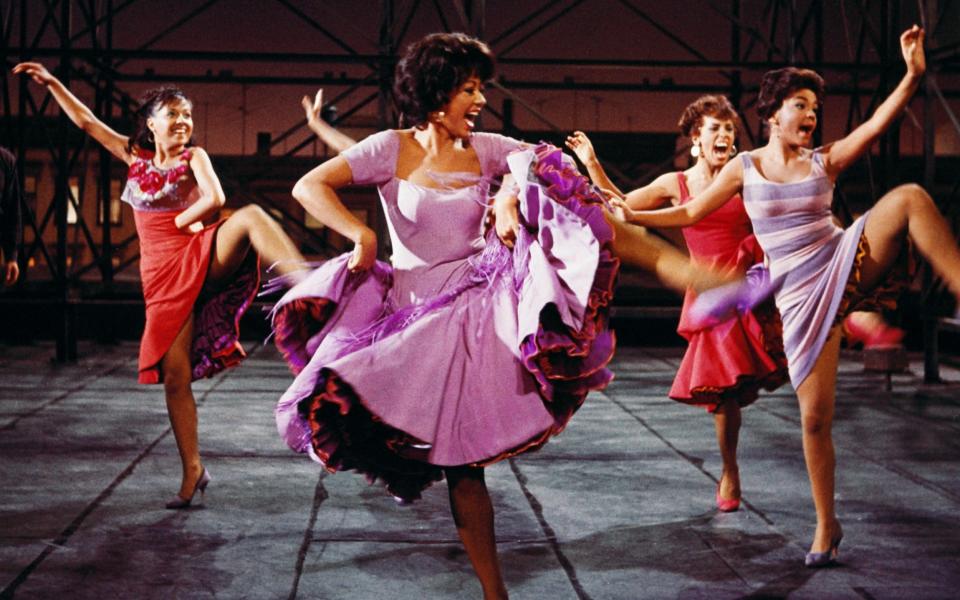
In his survey of musical theatre, Broadway Babies Say Goodnight, Mark Steyn pointed out that Sondheim “was a nobody until Anyone Can Whistle. All he’d done previously was write three solid hits, one after another... His first cult flop [made him] a genius too special for the expense-account set, the bridge-&-tunnellers and all the other schmucks who’d prefer to be vegged out at Hello, Dolly!”
It was an acute judgment. For all that his later reputation was strongest among the chattering classes (New York magazine once ran a headline that asked “Is Stephen Sondheim God?”), his career had met with popular success almost immediately. West Side Story, Leonard Bernstein’s version of Romeo and Juliet, for which Sondheim produced the lyrics, was a huge hit on the stage, running for 734 performances on Broadway and for 1,039 at Her Majesty’s, London, and became an even more successful film in 1961.
The brilliance of his lyrics (Bernstein had originally collaborated on them, but was so impressed by Sondheim that he withdrew his name from the credits) was immediately apparent. Sondheim was determined to concentrate on advancing character and plot through his lyrics: “Funny is better than clever,” he maintained. “Because clever is only fun for clever people.” Yet from the mid-1970s, Sondheim was a kind of cult for clever people, his successes an aberrance and his failures a vindication of his genius.
Stephen Joshua Sondheim was born in Manhattan on March 22 1930, the son of a prosperous garment manufacturer; from the age of seven he studied piano and organ. His parents divorced when Stephen was 10, after his father Herbert left home for another woman, and his mother Janet, known as “Foxy”, took him to live in Bucks County, Pennsylvania. Young Stephen was sent to military school, but his mother’s enthusiasm for celebrities meant that the lyricist Oscar Hammerstein became a family friend and a kind of surrogate father to the boy.
He had a frosty relationship with his mother; years later, when friends sent him a gift, his thank-you letter read: “Thanks for the plate. But where was my mother’s head?” The rift never healed, and he did not attend her funeral in 1992.
At 15 Stephen wrote a school show, which he thought was terrific. “I had visions of being the youngest ever on Broadway,” he said. “I asked Hammerstein to treat it as if it were a professional work and as if he did not know me. Next day when I went back for the verdict he said: ‘It’s the worst thing I ever read.” As my lower lip trembled, he added, ‘I didn’t say it was untalented. I just said it was terrible, and if you want to know why I’ll tell you’.
“We started with the opening stage direction and went through it, and by the afternoon I had had a very concise course in writing for the musical theatre. We spoke about everything, characters, plays, scenes, songs, how to structure each. So I dare say that I knew more about songwriting at the end of that afternoon than most people know in a lifetime, because I got the distillation of his experience. I was just the right age and soaked it all up.
Hammerstein then outlined a course for me which I in fact followed quite precisely over the next four years.”
Sondheim studied Music (and Mathematics, at which he excelled) at Williams College in Massachusetts, graduating in 1950 with the Hutchinson Prize for Musical Composition, a fellowship which enabled him to study with the composer Milton Babbitt. During the summer holidays, he worked as a “gofer” on Rodgers and Hammerstein’s musical Allegro.
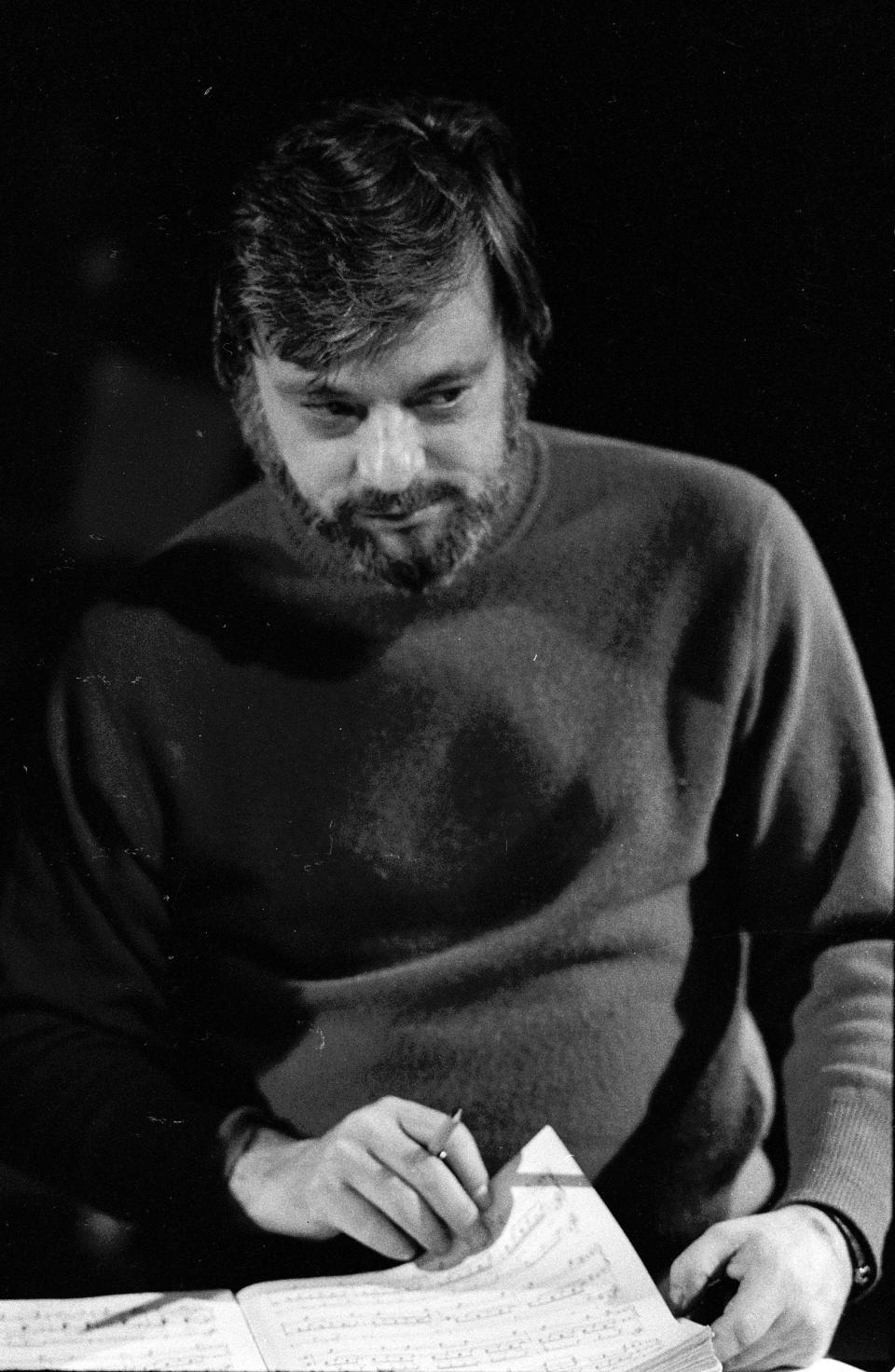
He wrote two shows for his college and in 1953 got a job as the clapper boy on John Huston’s film Beat the Devil. He then wrote several episodes of the television show Topper and put together a musical called Saturday Night, which was abandoned when the producer died (it eventually received its premiere at the Bridewell in London in 1997).
Sondheim continued to write materials for revues, notably in a collaboration with Mary Rodgers, daughter of Richard, on a pastiche of The Girl From Ipanema entitled The Boy From Tacarembo la Tumbe Del Fuego Santa Malipas Zatatecas la Junta Del Sol Y Cruz, which included lines such as “Why are his trousers vermilion? / Why does he say he’s Castilian? / Why do his friends call him Lillian?” In 1956 he wrote the incidental music for the Broadway show The Girls of Summer.
Later that year he received his big break when the playwright and librettist Arthur Laurents invited him to write the lyrics for West Side Story. The show was a hit; so was the film, which broke new ground by beginning before the cinema lights had even dimmed with a long, low whistle. Although Jerome Robbins was removed as director during filming, the sequences which he completed (the opening section, Jet Song, America, Cool and I Feel Pretty are numbered among the most substantial moments in musical cinema).
After West Side Story, Sondheim began to write Gypsy (1959), based on the life of the stripper Gypsy Rose Lee, but the star, Ethel Merman, demanded a more experienced composer. Jules Styne was brought in and Sondheim again provided only the lyrics – including the song Everything’s Coming Up Roses, a phrase which entered the language. It too was filmed (badly, with Rosalind Russell, in 1962).

A Funny Thing Happened on the Way to the Forum (1962), a farce based on the Roman dramatist Plautus’s work, was Sondheim’s first success as both composer and lyricist. With Zero Mostel in New York and Frankie Howerd in London as the leads, it was a great success (it was filmed by Richard Lester in 1966 with Mostel and Phil Silvers, but without most of the songs).
Two years later came Anyone Can Whistle, a disastrous flop about madness, corruption and an apparent miracle in a bankrupt small town. It later became a cult favourite of Sondheim fanatics – a mark of the devotion of acolytes to the most obscure elements of the master’s work was that There Won’t Be Trumpets, a song actually cut from the show during previews, became a staple of concerts and compilations of his songs.
The following year Sondheim fulfilled a deathbed promise to Oscar Hammerstein by collaborating with Richard Rodgers on Do I Hear a Waltz? It was an unhappy union: Rodgers, who was drinking heavily, described Sondheim’s lyrics as “shit” and banned Laurents, who had written the book, from rehearsals. The reviews were not favourable, and Sondheim’s professional relationship with Laurents broke down.
In 1965 Sondheim began instead to work with James Goldman on The Girls Upstairs, which was later to become Follies. But it was to take four years before the producer and director Hal Prince agreed to work on the show, on condition that Sondheim first look at adapting a series of short plays by George Furth.
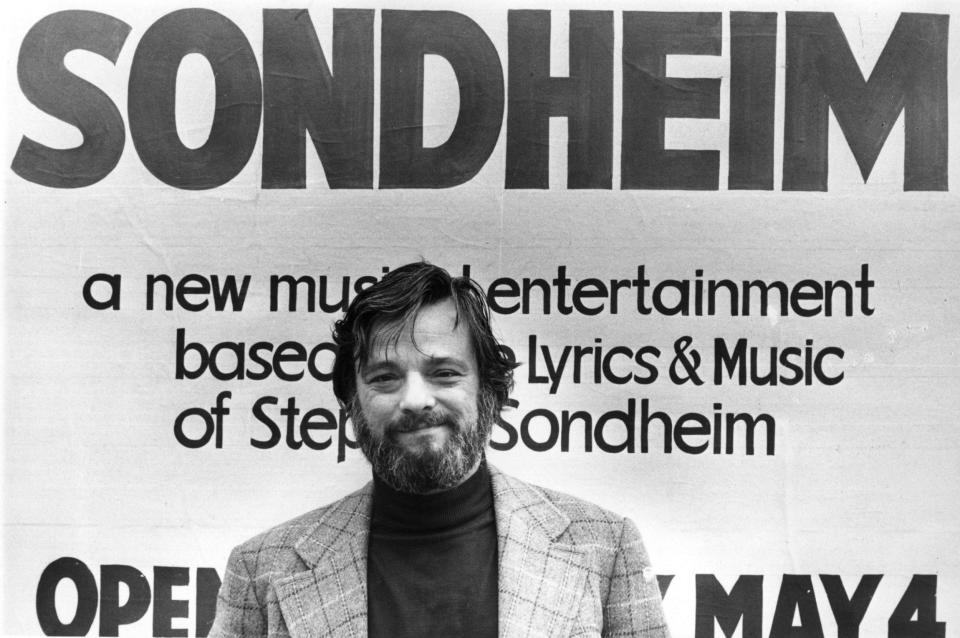
The result was Company (1970), which broke new ground by examining middle-class relationships in a series of often cynical vignettes. It was set at the moment when Bobby, a bachelor terrified of romantic commitment, is blowing out the candles on his birthday cake, and examined his relationships and those of his married friends.
The show ran on Broadway for a year and, in 1972, for 344 performances at the Haymarket in London. It was revived in the West End (Donmar, 1995-96, and Gielgud, 2018-19) and on Broadway in 2006-07 and in 2021. It won both a Grammy and a Tony for best score.
After writing perhaps the best-known number in the show, The Ladies Who Lunch, originally performed by Elaine Stritch, Sondheim bought an electric piano with headphones. He had been working on the song during the middle of the night in his New York brownstone and looked out to see his next-door neighbour (it was Katharine Hepburn) staring furiously at him through the window.
In 1971, Follies opened on Broadway (where A Funny Thing Happened on the Way to the Forum was also revived). Though it won seven Tonys and ran for 522 performances, it contrived to lose money, but demonstrated Sondheim’s astounding facility for pastiche.

The story of a reunion of retired chorus girls, it contrived also to be a sort of history of the musical, with songs in the style of Victor Herbert, Irving Berlin, George Gershwin and Cole Porter. Several – Broadway Baby, I’m Still Here, Losing My Mind – became standards themselves. But accomplished though the impersonations were, they were undercut by Sondheim’s evident cynicism. Mark Steyn pointed out that Sondheim “knows more about [Broadway composers] than anyone alive, and what does he tell us? That these songs are lies.”
The show has nonetheless achieved a celebrated status, and has been revived several times: at a celebrated Lincoln Center concert (which was filmed, and featured Barbara Cook, Elaine Stritch and Lee Remick) in 1985; in London at the Shaftesbury in 1987 (with Julia McKenzie, Diana Rigg, Dolores Gray and Eartha Kitt) and again in 2002 and 2017, and on Broadway in 2001 and 2011.
Sondheim won the Tony for best score for an unprecedented third year running with his next musical, A Little Night Music, which opened on Broadway in February 1973. It was based on Ingmar Bergman’s film Smiles of a Summer Night and written entirely in 3/4 time. It included what was unquestionably Sondheim’s best-known (though perhaps his least characteristic) song, Send in the Clowns, which became a hit for Judy Collins some years later and was subsequently recorded hundreds of times.
That year, he wrote (with his friend Anthony Perkins) the script for a murder mystery film, The Last of Sheila, which won awards for its ingenuity. By this stage, Sondheim’s enthusiasm for games (in the late 1960s he set the crossword puzzle for New York magazine) had become a byword, and inspired Anthony Shaffer’s play Sleuth (though there was no truth in the rumour that the play had originally been entitled Who’s Afraid of Stephen Sondheim?). He appeared on the cover of Newsweek.
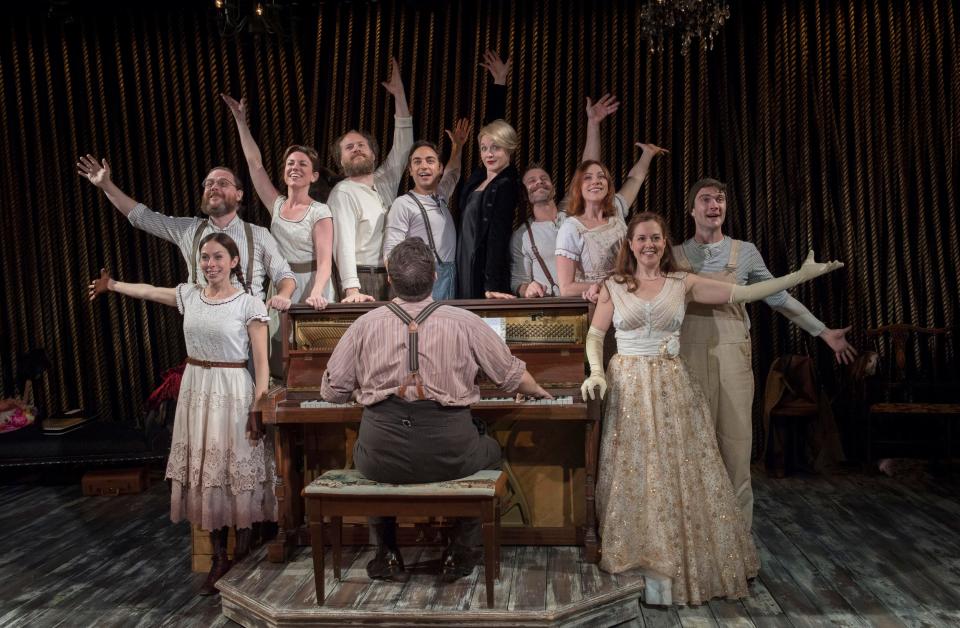
His beard – grown after a lazy spell in rehearsals during 1974 – and the absence of any contemporaries of comparable talent, added to his grizzled charm as the intellectual face of musical theatre, though he was still in his mid-forties. That year, he tried his hand at scoring for film, with Alain Resnais’s film Stavisky and, with Burt Shevelove, adapted The Frogs by Aristophanes for a production in the swimming pool at Yale University.
The cult of Sondheim was solidly launched by Ned Sherrin’s London revue Side by Side by Sondheim in 1976, which still necessitated programme notes explaining exactly who this genius was. But the devotion of his fans proved invaluable as Sondheim produced a series of musicals which, though subsequently hailed as masterpieces and frequently – even lucratively – revived, earned (at best) mixed reviews and emptied theatres on their first appearance.
Pacific Overtures (1976, book by John Weidman) told the story of Western engagement with Japan through a combination of all-male Kabuki theatre and a history of the musical. At the level of each song, themes included epistemology (Someone in a Tree), the rationale for assassination (Chrysanthemum Tea) and the politics and cultural aspects of collaboration with an occupying force (Bowler Hat). It was nominated for 10 Tonys but closed after six months (it was successfully revived by English National Opera in 1987, and in Chicago and subsequently the Donmar in 2006-07).
Sweeney Todd: The Demon Barber of Fleet Street (1979 on Broadway, the following year at the Theatre Royal, Drury Lane) fared better. Despite its moral – everyone is a potential psychopath – and an angular, contrapuntal score which owed much to Bernard Herrmann (composer of the music for Hitchcock’s Psycho), it ran for 577 performances in New York, won numerous awards, and was revived several times in the West End and on Broadway. In 2007 it was filmed by Tim Burton, with Johnny Depp, Helena Bonham Carter and Alan Rickman.
In 1981 Sondheim produced Merrily We Roll Along. It was perhaps his most accessible and melodic score – several numbers were immediately recorded by the likes of Barbra Streisand and Frank Sinatra – but an unmitigated disaster at the box office. The tale of a jaded and disillusioned composer told backwards in time, it closed after 16 performances; after various revivals it too joined the aficionados’ tally of neglected masterpieces by the maestro. Songs such as Good Thing Going, Old Friends and Not a Day Goes By went to the top of the fans’ list.
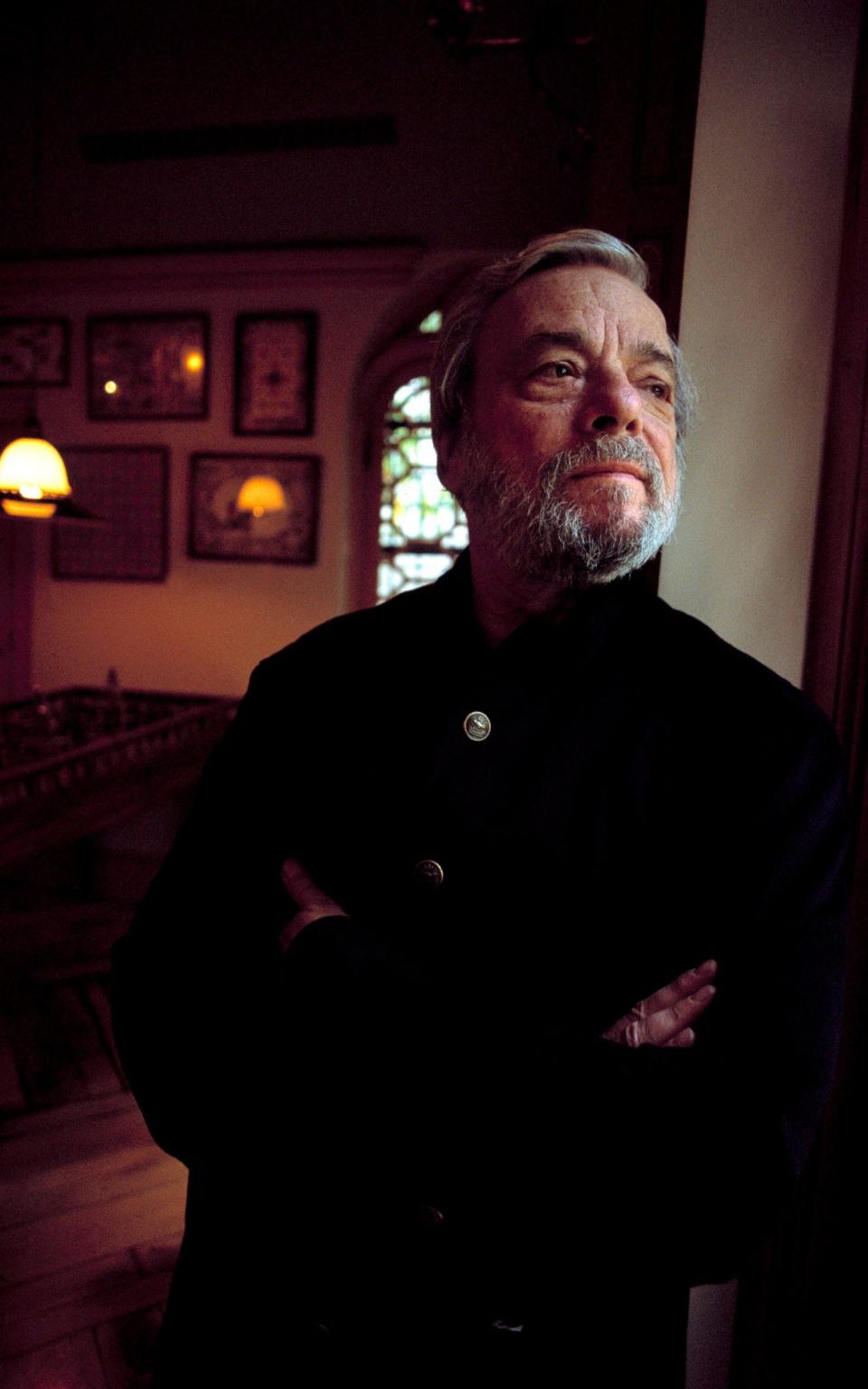
At first, Sondheim reacted to this failure by suggesting he would give up the theatre and write mystery stories (he did co-write a mystery play, Getting Away With Murder, which had a very short run on Broadway in 1996). Instead, he became yet more avant-garde, and perversely achieved rather greater popular success with Sunday in the Park With George (1984).
A collaboration with the designer and playwright James Lapine, it examined the artistic impulse through the work of the 19th-century French painter Georges Seurat and an imaginary contemporary descendant. It won a Pulitzer on Broadway and an Olivier at its London run at the National (1990); a popular and critically-lauded production by the Menier Chocolate Factory in 2005 won the Olivier for best revival and transferred to both the West End and Broadway.
Into the Woods, which combined several fairy tales and opened on Broadway in 1987, after a run in San Diego the previous year, was actually a popular hit, and ran for 764 performances; it was followed by a London run with Julia McKenzie and Imelda Staunton (Phoenix, 1990-91) and successful revivals on Broadway and in London.
Another collaboration with Weidman could have been designed to alienate the popular audience. Assassins, with a score which was a jaunty pastiche of the history of the American songbook, examined those who had tried to kill presidents of the United States. It opened off-Broadway in 1990, but failed to transfer (the first Gulf War made its subject matter particularly out of step with the public mood).
It launched the remodelled Donmar Theatre two years later in London, and made the name of the young Sam Mendes, who directed, but a planned Broadway revival was cancelled after the attacks of September 11 2001. It was eventually staged in 2004.
Passion (1994), based on an Italian film and in part told through love letters sung by the protagonists, won the Tony for Best Musical on Broadway, but it had the shortest run of any show which had done so, with 280 performances. The London production, with Michael Ball and Maria Friedman (Queen’s, 1996), had a similar run, with many critics complaining that the show was oddly passionless, though it did win the Evening Standard and Olivier awards for Best Musical.
Sondheim resumed his relationship with Hal Prince in 2003 with Bounce. Originally workshopped by Sam Mendes off-Broadway under the title Wise Guys, it again examined the American Dream, through the story of the Wizner brothers’ business dealings in the early years of the 20th century. It had unsuccessful runs in Chicago and Washington and never transferred to Broadway, though reworked under yet another title, Road Show, it had a brief outing off-Broadway in 2008.
In 2006 Sondheim announced that he was unlikely to produce any further substantive theatre work. “It’s age. It’s the diminution of energy and the worry that there are no more new ideas,” he told Time Out. He instead worked on a book of his annotated lyrics.
Sondheim also produced the music for Warren Beatty’s films Reds (1981) and Dick Tracy (1990); the latter won him an Academy Award for best song, Sooner or Later, performed by Madonna. He was elected to the American Academy of Arts and Letters in 1983, won the National Medal for the Arts in 1997, and served as the first Cameron Mackintosh Professor of Contemporary Theatre at Oxford in 1990.
Stephen Sondheim, who was described as introverted and solitary, and admitted to having felt like an outsider from an early age, came out as gay when he was 40. He lived with the dramatist Peter Jones in the 1990s, and in 2017 married Jeff Romley, who survives him.
Stephen Sondheim, born March 22 1930, died November 26 2021

 Yahoo News
Yahoo News 
